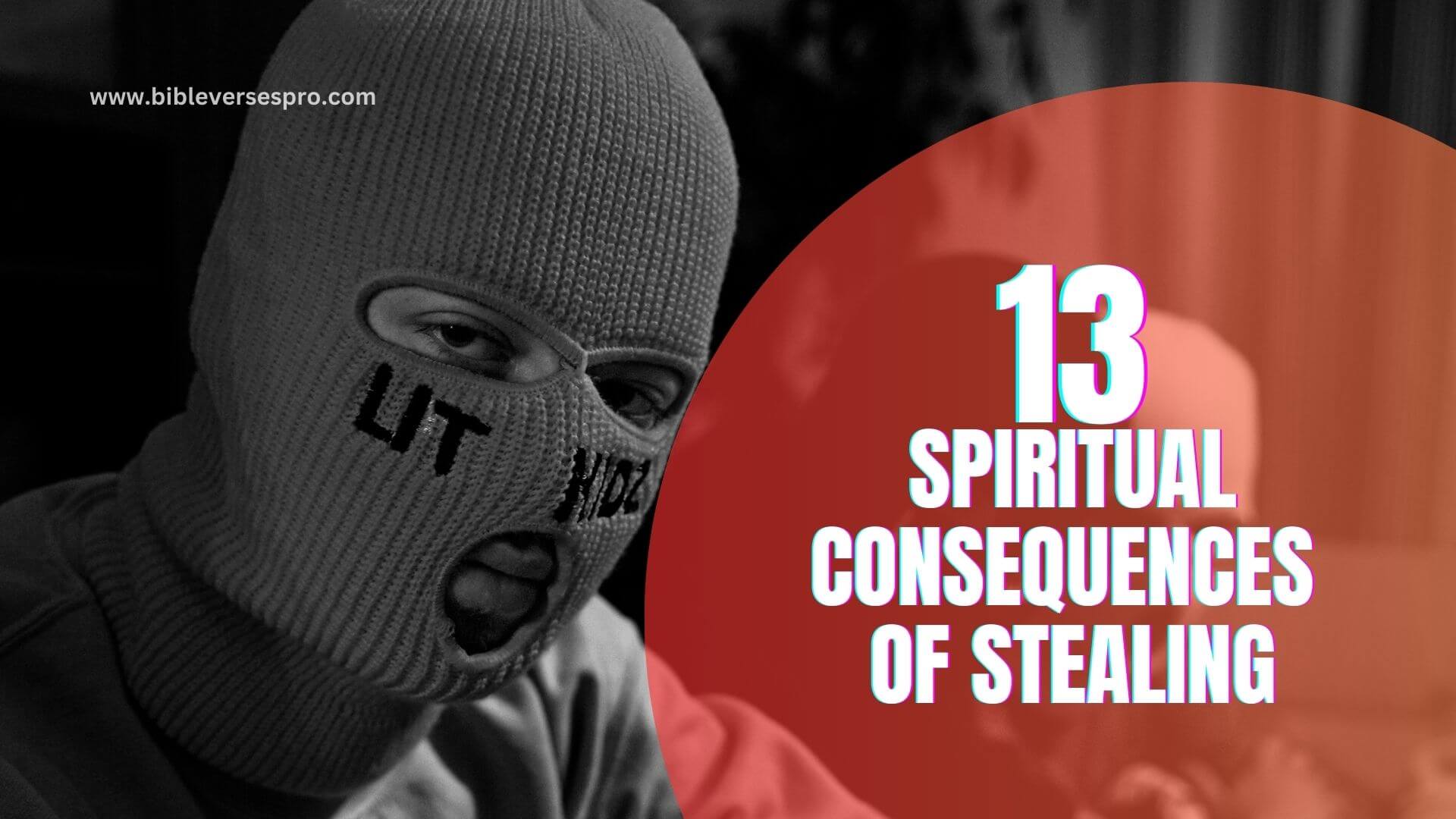Stealing is the act of taking someone else’s property, belongings, or resources without their consent or permission.
While stealing is commonly associated with tangible objects, such as money or possessions, it can also encompass intellectual property, ideas, and intangible aspects of life.
Stealing not only has tangible and legal ramifications but also carries significant spiritual consequences.
When one engages in stealing, they disrupt the natural order of fairness, trust, and integrity, leading to a range of spiritual consequences of stealing that can impact their well-being and spiritual growth.
Spiritual Consequences Of Stealing
Stealing violates these fundamental principles, resulting in spiritual discord and disharmony.
Throughout this outline, we will explore 13 spiritual consequences of stealing, shedding light on the internal and external impacts that arise from engaging in such behavior.
By understanding these consequences, we can gain insight into the importance of integrity, empathy, and ethical conduct in our lives, and work towards personal growth, healing, and spiritual development.
1. Loss of Trust
-
Betrayal Of Others Trust
One of the significant spiritual consequences of stealing is the betrayal of others’ trust. When we steal from someone, we break the trust they have placed in us, whether it be a family member, friend, employer, or a larger community.
Trust forms the foundation of healthy relationships and social bonds, and stealing erodes that foundation, leaving behind feelings of betrayal, hurt, and disappointment.
The act of stealing can cause deep emotional wounds, fracturing relationships and creating a sense of distance between individuals.
-
Difficulty In Rebuilding Trust
Rebuilding trust after stealing can be an arduous and lengthy process. The consequences of stealing often extend far beyond the moment of theft, and the impact can linger for a long time.
Regaining the trust of those affected requires consistent effort, transparency, and accountability. It may involve making amends, acknowledging the wrongdoing, and demonstrating genuine remorse and change.
However, even with sincere efforts, the rebuilding of trust may not always be possible, leading to strained or severed relationships.
The loss of trust resulting from stealing can have long-lasting effects on both the thief and those affected, impairing their ability to form trusting connections in the future.
2. Guilt and Shame
Inner Turmoil And Guilt
Engaging in stealing often triggers a profound sense of guilt within the individual. The internal conflict between knowing that one has violated the rights of others and their moral compass can create a constant state of inner turmoil.
The weight of guilt can be overwhelming, leading to sleepless nights, anxiety, and a deep sense of remorse.
The individual may grapple with their actions, questioning their integrity, and experiencing a sense of moral dissonance. The spiritual consequences of stealing manifest in the form of a troubled conscience, disrupting inner peace and harmony.
-
Damage To Self-Esteem and Self-Worth
Stealing can also inflict significant damage to an individual’s self-esteem and self-worth. The realization of having committed an act that goes against their values and principles can lead to a diminished sense of self-worth.
They may perceive themselves as unworthy, flawed, or morally bankrupt, which can have a profound impact on their overall well-being.
The resulting shame and self-criticism can create a negative cycle of self-perception, hindering personal growth, and impeding their ability to cultivate a healthy self-image.
3. Negative Karma
-
Violation Of Moral And Ethical Principles
Stealing is a clear violation of moral and ethical principles that are deeply ingrained in various religious and spiritual traditions.
These principles emphasize honesty, respect for other’s property, and the recognition of the interconnectedness of all beings. When one engages in stealing, they actively disregard these principles and create negative karma.
Karma is the law of cause and effect, suggesting that our actions have consequences that reverberate back to us. By choosing to steal, individuals generate negative karma, which can manifest as future difficulties, obstacles, or suffering.
-
Accumulation Of Negative Energy
Stealing generates negative energy that permeates an individual’s spiritual and energetic field.
Every action carries a vibrational frequency, and stealing is associated with a lower vibrational frequency due to the dishonesty, harm, and disregard for others it entails.
This negative energy can accumulate and affect not only the thief but also the surrounding environment and relationships.
The accumulation of negative energy can create a cloud of disharmony, attracting further negative experiences and inhibiting the flow of positive energy.
4. Disconnection from Spirituality
-
Breaking Spiritual principles
Stealing disrupts the harmony and alignment with spiritual principles, leading to a disconnection from spirituality itself.
Many spiritual traditions promote values such as integrity, compassion, and non-harming. Engaging in stealing directly opposes these principles and creates a misalignment with the core teachings of spirituality.
As a result, individuals may feel a sense of disconnection from their spiritual path, as their actions contradict the values and principles they aspire to embody.
-
Straining The Relationship With a Higher Power
Stealing can strain an individual’s relationship with a higher power, however, they may perceive it.
Whether one follows a religious doctrine or has a personal spiritual belief, stealing creates a sense of separation and distance from the divine.
The act of stealing violates the trust and integrity necessary for a strong spiritual connection.
It can lead to feelings of guilt, shame, and unworthiness, making it challenging to establish or maintain a deep connection with a higher power. The resulting disconnection can hinder spiritual growth, inner peace, and a sense of purpose.
5. Loss Of Integrity
-
Compromising Personal Values
Engaging in stealing undermines an individual’s values and principles. Integrity involves living in alignment with one’s deeply held beliefs and ethical standards.
When someone steals, they compromise their values, succumbing to the temptation of dishonesty and disregarding the rights of others.
This compromise erodes their sense of integrity and weakens their moral compass, leading to inner conflict and a loss of self-trust.
-
Erosion Of Character And Reputation
Stealing damages an individual’s character and reputation. Character is the sum of one’s qualities, including honesty, trustworthiness, and moral strength.
When someone engages in stealing, their character becomes tainted, as their actions contradict the qualities that define a person of integrity.
The erosion of character often leads to a negative perception of the individual by others, affecting their reputation. Trust and respect diminish, and the thief may find themselves isolated or ostracized from social circles and communities.
6. Damaged Relationships
-
Strained Relationships With Loved Ones
Stealing can cause severe strain on relationships with loved ones. The act of stealing violates trust and undermines the foundation of any healthy relationship.
Loved ones may feel hurt, betrayed, and deeply disappointed when they discover that someone close to them has stolen from them or others.
The damage inflicted on the relationship can be difficult to repair, as it requires extensive effort, transparency, and consistent demonstration of change to rebuild the broken trust.
-
Loss Of Respect and Damaged Bonds
Stealing leads to a loss of respect from others and damages the bonds that connect individuals.
Respect is earned through demonstrating integrity, honesty, and ethical behavior. When someone steals, they forfeit the respect of others, as their actions reflect a disregard for these values.
The loss of respect can result in strained relationships, fractured friendships, and a diminished support network. It becomes challenging to rebuild the broken bonds and the consequences of stealing ripple through various areas of one’s life.
7. Lack of Abundance
-
Blockage Of Positive Energy Flow
Stealing creates a blockage in the flow of positive energy and abundance. When one engages in dishonest acts such as stealing, they disrupt the natural energetic exchange that underlies abundance.
The act of taking what is not rightfully theirs sends a message to the universe that they do not trust in the abundance available to them. This blockage can prevent the flow of positive opportunities, resources, and blessings into their lives.
-
Diminished Opportunities and Blessings
Stealing can diminish the opportunities and blessings that would otherwise come into an individual’s life.
When one engages in unethical behavior, they close themselves off from the positive outcomes that arise from acting with integrity.
The universe responds to our actions, and by stealing, individuals limit their potential for growth, success, and fulfillment. This limitation can lead to a lack of prosperity and a sense of deprivation in various aspects of life.
8. Self-Imposed Limitations
-
Stifling Personal Growth And Development
Stealing imposes limitations on an individual’s personal growth and development. Engaging in dishonest acts inhibits their ability to evolve morally, ethically, and spiritually.
It hinders their capacity to cultivate qualities such as honesty, integrity, and empathy, which are essential for personal growth.
The cycle of stealing creates a stagnant state, preventing the individual from reaching their full potential and hindering their journey towards self-improvement.
-
Self-sabotage Due to Unresolved Guilt
The guilt associated with stealing can lead to self-sabotage. Individuals burdened by guilt may unconsciously undermine their progress, success, and happiness as a form of self-punishment.
They may believe that they do not deserve positive outcomes or that they must suffer for their past actions. This self-sabotage perpetuates a cycle of negativity, preventing the individual from moving forward and finding true healing.
9. Increased Fear and Paranoia
-
Fear Of Being Caught or Exposed
Engaging in stealing often brings about an increased fear of being caught or exposed. The individual may constantly worry about the consequences of their actions, living in a state of anxiety and apprehension.
The fear of being discovered can create immense stress and strain on their well-being, leading to a constant state of unease.
-
Heightened Anxiety and Mistrust of Others
Stealing can contribute to heightened anxiety and a deep sense of mistrust toward others. Individuals who have stolen may project their actions and guilt onto others, becoming suspicious and distrusting of those around them.
This heightened sense of paranoia can strain relationships, isolate the individual, and further contribute to their spiritual and emotional distress.
10. Reduced Spiritual Progress
-
Hindrance In Spiritual Growth And Enlightenment
Engaging in stealing acts as a significant hindrance to spiritual growth and enlightenment. Spirituality often involves a path of self-discovery, inner transformation, and connection with a higher power.
However, stealing creates barriers on this path, obstructing the individual’s ability to deepen their spiritual understanding and experience higher levels of consciousness.
The negative energy associated with stealing weighs down the soul and impedes the individual’s progress toward spiritual awakening and enlightenment.
-
Delayed Progress On The Spiritual Path
Stealing can result in a delay in the individual’s progress on their spiritual path. The consequences of stealing, such as guilt, shame, and karmic debt, create distractions and obstacles that divert their focus from spiritual development.
Rather than advancing on their journey, they find themselves caught up in the repercussions of their actions, unable to fully commit to their spiritual practices or receive the guidance and insights necessary for their growth.
The delay in spiritual progress can be frustrating and can leave the individual feeling stuck or disconnected from their true purpose.
11. Spiritual Debt
-
Accumulation of karmic debt
Engaging in stealing accumulates karmic debt, which refers to the consequences or debts incurred through one’s actions.
Stealing disrupts the natural balance and harmony of the universe, and the energetic repercussions of such actions create a debt that must be resolved.
This karmic debt may manifest in future lifetimes or the present life, and it may involve experiencing similar losses, theft, or a lack of abundance. Resolving this debt requires taking responsibility for one’s actions, making amends, and actively working toward restitution and healing.
-
Need For Spiritual Restitution And Healing
Stealing calls for spiritual restitution and healing. It involves acknowledging the wrongdoing and recognizing the impact it has had on oneself and others.
Restitution may involve returning what was stolen, compensating for the loss, or offering sincere apologies. Healing requires inner work to address the root causes of the behavior, such as unresolved emotions, traumas, or limiting beliefs.
Through self-reflection, forgiveness, and engaging in spiritual practices that promote self-growth and compassion, individuals can begin the process of healing and restoring their spiritual well-being.
12. Redemption and Healing
-
Acknowledging The wrongdoing
Redemption and healing begin with acknowledging the wrongdoing.
This involves taking full responsibility for the act of stealing, understanding its impact on oneself and others, and accepting the consequences of those actions.
It requires facing the truth, being honest with oneself, and cultivating a genuine desire for change and growth.
-
Seeking Forgiveness And Making Amends
Seeking forgiveness and making amends are essential steps toward redemption and healing.
This involves reaching out to those affected by the stealing, expressing genuine remorse, and actively working to repair the harm caused. Making amends may involve restitution, offering assistance or support, or participating in community service.
Seeking forgiveness from oneself and a higher power is also crucial in the process of letting go of guilt and shame, allowing for personal growth and a renewed sense of spiritual connection.
13. Distorted Perception of Material Wealth
-
Attachment To Material Possessions
Engaging in stealing can lead to a distorted perception of material wealth. By obtaining items or resources through dishonest means, individuals may develop a misguided attachment to material possessions.
This attachment can stem from the belief that material wealth is the key to happiness, security, or personal worth.
However, this perspective neglects the spiritual truth that true fulfillment and abundance come from within and cannot be attained through unethical actions.
Conclusion
Stealing carries profound spiritual consequences that affect various aspects of an individual’s life.
It leads to the loss of trust, both in oneself and from others, as the betrayal of trust strains relationships and makes rebuilding difficult. The guilt and shame associated with stealing create inner turmoil, damaging self-esteem, self-worth Etc.
Understanding these spiritual consequences highlights the importance of ethical behavior and integrity. It reminds us to align our actions with our deepest values, cultivating honesty, respect, and compassion toward others.
By doing so, we foster positive karma, strengthen our spiritual connection, and create a harmonious and fulfilling life. Choosing integrity not only benefits ourselves but also contributes to the greater good of humanity, fostering a world built on trust, compassion, and spiritual growth.







